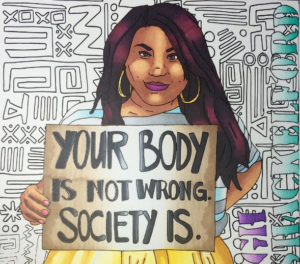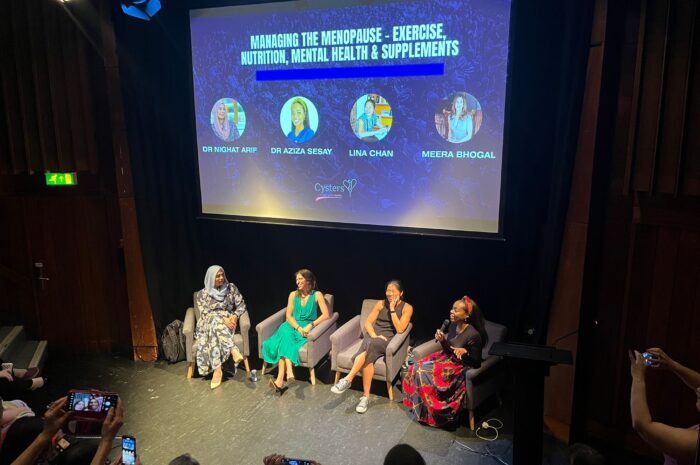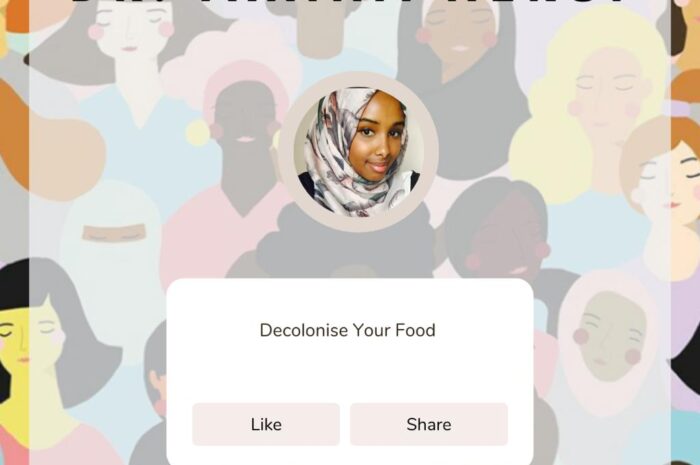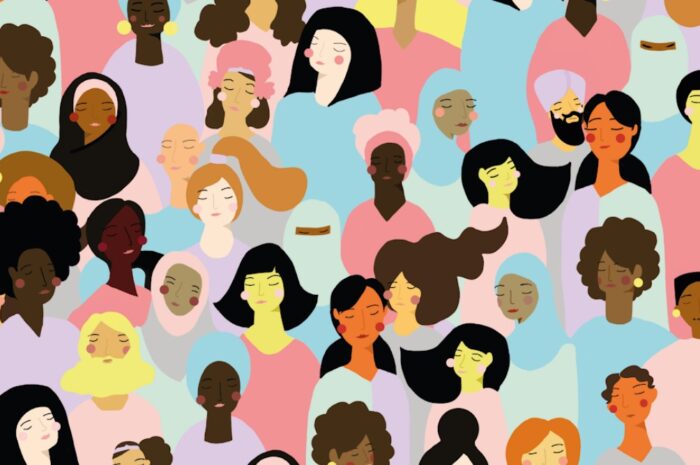
Weight Stigma is defined as bias of discrimination towards individuals who are perceived by others to be overweight or obese. Having Polycystic Ovary Syndrome (PCOS) I’ve experienced it myself. Here’s one example. A few years ago, I attended a Gynaecologist appointment on the 9th floor of the hospital block. I was feeling very poorly at the time with pain, heavy menstrual bleeding and huge clots on and off for almost 3 months. I was worried I might have cancer. After all, we are always encouraged to get any irregular bleeding checked.
On my arrival, the gynaecologist opened my medical file and he proceeded to circle my weight with his pen. Circling round and round. “How did you get here?” he asked. I replied that I got the bus. “No”, he said, “How did you get to the 9th floor?”. I replied that “I got the lift”. He questioned “why not the stairs?” and launched into a lecture about how I was such a young woman and that I shouldn’t be that weight. I was lost for words and swiftly left the room, never to return.
THE CONSEQUENCES OF WEIGHT STIGMA
There is a constant negative discourse associated with living in a larger body. We are constantly reminded of it through the media and healthcare but it has real life consequences. Women with PCOS are more likely to be obese than non-PCOS females [1]. Yet a recent study on PCOS found that participants felt they were stigmatised in relation to weight and a failure to respond to treatments [2]. It has been reported that doctors often associate overweight and obesity with non-compliance, hostility and dishonesty. For example, 87% believe obese people are indulgent and 32% lack willpower. Many prefer not to treat overweight patients [7]. While 50% of people were not offered any suggestions on how to lose weight it has also been found that often doctors underestimate people’s desire to lose weight [8].
Weight stigma can compound the consequences of overweight and obesity, and may lead to disordered eating and increased calorie consumption [3]. It can contribute to bias by healthcare providers that may affect clinical judgements and can result in women delaying seeking help due to embarrassment [4]. Weight stigma also hinders diagnosis and negative comments can lead to disengagement which has the potential for serious conditions to go undetected [5] Despite the fact that higher-weight patients are at elevated risk for endometrial and ovarian cancer, some physicians report a reluctance to perform pelvic exams [6]
TIME FOR CHANGE
It has been suggested that increasing awareness through sensitivity training in medical staff and ensuring inclusive medical facilities will have a huge impact on women’s health care [9]. Training should include education about non-behavioural contributors to BMI such as genes and diseases that create obesity as a symptom such as PCOS [5]. Other suggested changes include creating more accessible environments by providing for example larger examination gowns. Most importantly, the need to treat people with respect and remove prejudice and blame [10]. Cysters have a part to play too. We can call it out each time we experience it simply by saying “That’s weight stigma”.
With this in mind, a few Cysters have kindly offered to share their experiences of weight stigma to raise awareness of how it has impacted their health…
“I was told by gynae I must have PCOS because of my size. When the ultrasound was negative, she was confused. I was then told I didn’t have endometriosis as it didn’t show up on the scan. She said my pain was because I was overweight, and that meant I just felt it more. She said I should lose weight to fix my periods and discharged me. A year later, after getting referred elsewhere, I was diagnosed with endometriosis. My weight has no factor in this. I often think about that lost year of extreme pain with no treatment because she judged my weight, not my medical condition.”
“She (Gynaecologist) said my pain was clearly caused by my weight and that my stomach was pushing on my ovaries and causing the problem. I would rather be in pain and deal with it on my own than face the same old “you’re too fat from the medical professionals”. I just don’t believe its all down to weight.”
“Aged 14, I was diagnosed in a five minutes appointment as having PCOS, being fat and told if I did more exercise, I would lose the weight and be fine. Tried my best after that, couldn’t lose the weight. Eventually saw an Endocrinologist aged 16 and found out so much more information about how it can be difficult to lose weight, the effect PCOS has on your blood sugar, thyroid, lipids etc. But I have never forgotten that first appointment with the gynae and now as an adult who knows so much more about PCOS, it’s just really not acceptable behaviour.”
“For the last few years I went to many doctors but no one could actually find a solution to my problem but they went on saying about my weight issues. I had to endure the wrath of both male and female Gynos. It went to the level that I used to feel depressed sometimes. Now I literally run away from docs.”
“I had a Doctor tell me I looked like I’d had kids before because of the stretch marks on my tummy when I haven’t had kids and can’t even either.”
“Every time he (gynaecologist) would always ask if I was trying to lose weight and it was the same thing repeated every time…it really hurt my feelings and I know I am over weight but I don’t need someone rubbing it in my face everyday.”
“I stopped getting treatment for four years because I was sick of being told my symptoms and problems were weight related. Finally got a fab gynaecologist after attending hospital for a totally unrelated problem.”
“I was told that the reason I have period issues was because I was fat and that if I lost the weight, I wouldn’t have issues. Even when I was at “normal” weight I still had issues and I told him that. He still said it was my weight.”
“I also got a few comments about the reason I couldn’t lose weight was because I was biracial.”
“I hate going to the gynaecologist…lose weight and you’ll feel better…no shit Sherlock.”
“I don’t think I would be considered fat but after I was diagnosed with PMDD and taking medication, I went to visit my GP. I went to visit my GP as I had sore boobs for over 6 months by then and the medication was not helping my physical symptoms. I did put on significant weight like 7-8 kgs. The first thing my GP says is you look like you’ve put on some weight, when was the last time you weighed yourself? I wanted to cry. My physical symptoms were so bad that I felt like my clothes were uncomfortable and just that one comment and I didn’t want to tell her anything. Then she was examining my breasts and she literally says wow those look huge. Just recalling that incident makes me want to cry”.
“It’s ‘cause I have PCOS, I’m not obese but I carry all my weight on my stomach and for some reason no-one expects that in a woman. It’s so rude (negative comments) and it really knocks my confidence. I’ve lost over a stone since April but I’m still getting this shit”.
“I had a horrible experience because I wasn’t loosing weight fast enough for him!.
“I had a woman tell me that I was too fat to conceive (I was size 20 at the time). She then said if I did, it would be a miracle if I carried full term. And even then, I would never live long enough to see my child grow up.”
“I was just given a sheet to get bloods done and was told I’m fat which of course I already knew, she doesn’t need to tell me that and no advice. Then she told me on my next appointment that if I hadn’t lost any weight don’t bother coming back, I must have cried 3 times in the space I was there and was brought through a crowd of people while in tears to check my weight on the scales. Well I never went back to that bitch and too me 2 years to get up and go to my GP after that to try to sort out my issue and had to wait another 2 years for an appointment to be told by a very good Gyno in less than 15 minutes what was wrong with me and why I found it so hard to lose weight with an internal scan. Never let anyone talk you down”.
“for years my doctor was so flippant about my weight and every single other aspect of PCOS. Very blunt with no info, and it was only 3 weeks ago that I actually learned the impact weight can have and that’s 7 years after getting diagnosed”.
“I went to the doctor first at 14 with all the classic signs of PCOS, his response was to tell me losing weight would fix it. I kept going back over the years and the answer was always lose weight. No other tests were done and they wouldn’t refer me. So I gave up until I was 24 when I went to a different doctor. She sent me straight for scans, result PCOS and Endo. The Gyno explained this was not weight related, it was hormonal. I wanted a confirmatory laparoscopy (at this point I had lost over 15kgs). Doctor said he could do it but it wasn’t worth it. So I gave up arguing. Fast forward 7 years living in a new area and a great GP who was shocked at my treatment by the “you’re too fat for the laparoscopy Gyno”. She has offered me whatever treatment I want (I now have Stage 4 Endo pretty much everywhere because of the negativity around even getting a diagnosis) and she has been really supportive. Its frustrating it took to age 33 to really be listened to. I bought a Fitbit to show evidence to doctors of how much exercise I do everyday as until this GP no one believes me. Being fat shouldn’t be a reason not to be treated for things.”
“The doctors told me to eat less and exercise more. I developed a serious eating disorder. I am getting better with it. But it still rears its ugly head from time to time.”
© Busby, M (2019)
Special thanks to all the women who have shared their stories. These stories are subject to copyright and must not be used for any research purposes or reproduced in any way either partially or in their entirety.
References:
[1] U. Durmus, C. Duran, S. Ecirli, Visceral adiposity index levels in overweight and/or obese, and non-obese patients with polycystic ovary syndrome and its relationship with metabolic and inflammatory parameters, J. Endocrinol. Invest. 40 (2017) 487–497. doi:10.1007/s40618-016-0582-x.
[2] M. Busby, L. Simpson, Perceptions of coping with the long-term consequences of Polycystic Ovary Syndrome at different stages of the menopausal transition ., (2019).
[3] T. Lancet Public Health, Addressing weight stigma, 2019. doi:10.1016/S2468-2667(19)30045-3.
[4] M. Burke, Stop the Stigma! Eliminating Implicit and Explicit Bias Toward Adult Obese Women Receiving Gynecological Care: A Quality Improvement Project to Cultivate Empathy and Increase Knowledge of Best Practices, Dr. Nurs. Pract. Proj. (2018). https://scholarworks.umass.edu/nursing_dnp_capstone/152 (accessed August 8, 2019).
[5] A.J. Tomiyama, D. Carr, E.M. Granberg, B. Major, E. Robinson, A.R. Sutin, A. Brewis, How and why weight stigma drives the obesity ‘epidemic’ and harms health, BMC Med. 2018 161. 16 (2018) 123. doi:10.1186/s12916-018-1116-5.
[6] C.H. Adams, N.J. Smith, D.C. Wilbur, K.E. Grady, The Relationship of Obesity to the Frequency of Pelvic examinations, Women Health. 20 (1993) 45–57. doi:10.1300/J013v20n02_04.
[7] R. Puhl, K.D. Brownell, Bias, Discrimination, and Obesity, Obes. Res. 9 (2001) 788–805. doi:10.1038/oby.2001.108.
[8] I.D. Caterson, A.A. Alfadda, P. Auerbach, W. Coutinho, A. Cuevas, D. Dicker, C. Hughes, M. Iwabu, J. Kang, R. Nawar, R. Reynoso, N. Rhee, G. Rigas, J. Salvador, P. Sbraccia, V. Vázquez‐Velázquez, J.C.G. Halford, Gaps to bridge: Misalignment between perception, reality and actions in obesity, Diabetes, Obes. Metab. 21 (2019) dom.13752. doi:10.1111/dom.13752.
[9] S.R. Lindheim, T.L. Glenn, L.D. Whigham, Recognizing and eliminating bias in those with elevated body mass index in women’s health care., Fertil. Steril. 109 (2018) 775–776. doi:10.1016/j.fertnstert.2018.03.002.
[10] R.M. Puhl, C.A. Heuer, The Stigma of Obesity: A Review and Update, Obesity. 17 (2009) 941–964. doi:10.1038/oby.2008.636.
Picture Credit: Allison Tunis



